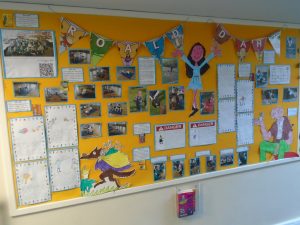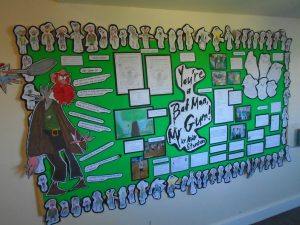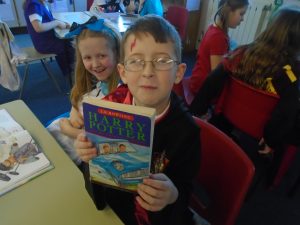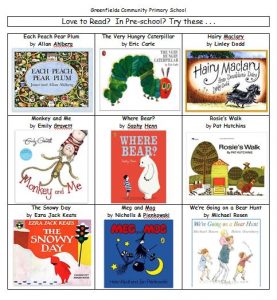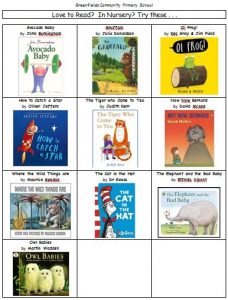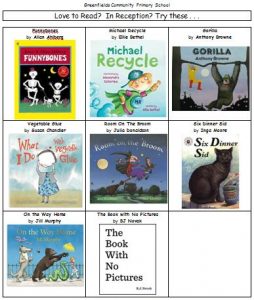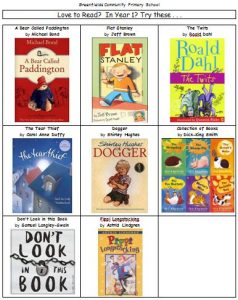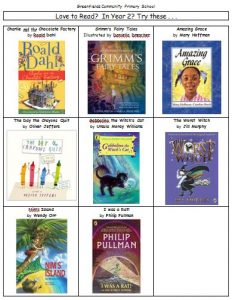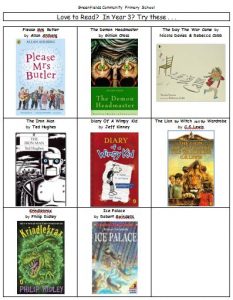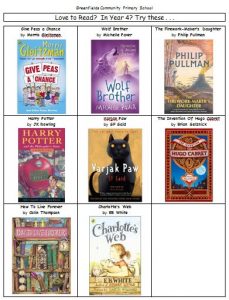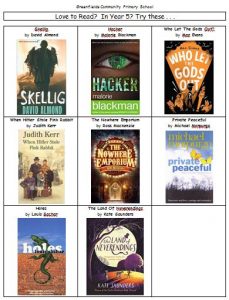At Greenfields, we believe that learning to read is an essential part of every child’s education, because reading is the key to success. As well as teaching children how to read, we aim to foster a love of reading in our children through exposure to exciting, challenging and meaningful texts throughout the curriculum.
Learning to Read
At Greenfields, we teach the children to read through ‘phonics’. Simply put, this is the process by which speech is written. In Early Years and KS1, children have daily phonics sessions, using the Read, Write, Inc. programme. Read Write Inc. is rooted in children having lots of chances to overlearn; to hear and say the sounds they need to read and in turn overlearn what these sounds look like when they are written down. Children are assessed every 6-8 weeks and are taught in groups with children who know the same sounds as them fluently.
To support our teaching of phonics and the children’s overlearning of the sounds they need, we will be sending home some new reading books for you to use at home. Books will be changed on Mondays and the children will take home at least 2 reading books. Some weeks, your child might also be given an additional book or books on a Wednesday; this will depend on how quickly the children are working through the sounds in their phonic sessions.
Children take home a small ‘paper’ book which is mainly grey and white inside. This is for children to practise at home the sound that they are learning in their phonics lessons. These books are quite short and the words in them often rhyme. They give the children an opportunity to ‘overlearn’ the sound and there are some questions at the back of this book which parents can also look at with their children.
Children also take home a glossy ‘book bag book’. This is a story book that allows the children to practise the sound they are learning in a different context.
We ask parents and carers to spend 10 minutes after school reading both of these books with their children. The books are not designed to be overly challenging, the reason for having them is so that the children can become more than fluent in the sounds they have learnt so far.
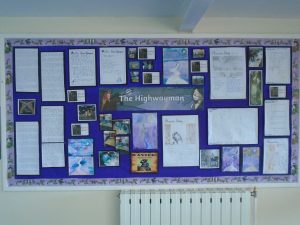
You can also follow this link to find out more about Read, Write, Inc:
http://www.ruthmiskin.com/
From Early Years up to Year 6 we introduce the children to a wide range of books, genres and authors through high-quality, engaging texts. We ensure that these texts link closely to our Enquiry based thematic planning in order to provide a coherent cross-curricular experience. It also means that the children can explore the wider context of the text through their Enquiry lessons. We also provide meaningful reading opportunities linked to our school values using fiction, non-fiction or poetry as the stimulus for our value weeks at the end of each term.
Reading to Learn
Reading and discussing stimulating fiction, non-fiction and poetry in class also develops children’s comprehension skills. Every day children throughout school receive explicit teaching of reading skills. Children need good linguistic knowledge (in particular of vocabulary and grammar) and a broad knowledge of the world. Throughout the curriculum we plan enriching learning experiences, in and out of class, to broaden the children’s knowledge of themselves and the world. In KS2, we have daily reading skills sessions which last 20-25 minute, in addition to our English lessons. Where possible, we use texts that support our learning across the curriculum. We make sure that the children meet a range of text-types so fiction, non-fiction and poetry are all covered. The sessions are broadly arranged as follows:
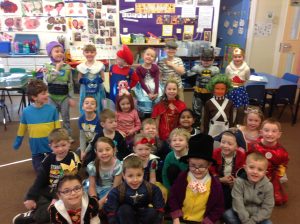
Monday – activities that focus on the vocabulary needed to understand the text
Tuesday – Book Talk, a structured class discussion based on a piece of text, where children are encouraged to come up with their own opinions and try to persuade others, all based on the evidence they read
Wednesday – Shared Reading, which is where the teacher models good reading aloud of the text. The children take their turn reading aloud as a whole class, small groups and independently, and analyse their fluency
Thursday – explicit teaching a particular reading skill eg inferring or summarising
Friday – opportunities to practise and apply the skill taught
Reading for Pleasure
Books are at the heart of school life at Greenfields, and we want our children to discover their own genuine love of reading. In order to do this, we have in place a number of ways to show them that reading is, above all, fun!
- Class reader – this is a book that the children help to choose and is read aloud every day, for pure enjoyment.
- Reading assemblies – Each week, KS1 and KS2 have an assembly where a teacher chooses a favourite book to read to them, or a chapter books over a number of weeks
- Weekly reading recommendations – each week, in the school newsletter, we recommend a fantastic book that supports a deeper understanding of a text linked to our school value.
- Book Chat – talking about books is actively encouraged! We make time for informal conversations about books whether this is between staff and children, or among the children themselves. We think this is vitally important as it can lead children to discover new titles and authors they may never have met before in a relaxed way.
- World Book Day – always a date to look forward to; this is when we get to celebrate our favourite books and authors
- Offering a wide range of texts – we know that children, just like adults, all have different tastes when it comes to reading, so we try to offer a wide range such as graphic novels, non-fiction, poetry and weekly publication such as First News
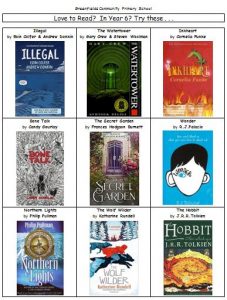
What can you do at home?
Research shows that a child who reads for pleasure every day greatly increases their life chances. Here are some ideas you can try at home:
- Make books part of the furniture at home – Always have books around do that you and your children are ready to read whenever there is a chance. It doesn’t have to break the bank to stock a bookshelf – there are plenty of second-hand shops where you can pick up lovely books for around 50p.
- Join your local library – Get your child a library card! And they often sell off old stock very cheaply too.
- What is your child interested in? – Help them find the right book – it doesn’t matter if it’s fiction, poetry, comic books or non-fiction.
- All reading is good – Don’t worry if your child only seems to like reading the newspaper; leaflets, cereal packets, instruction manuals, comics are all good practice. Reading is reading – it is all valuable!
- Get comfortable! – Snuggle up somewhere warm and cosy with your child, either in bed, on a beanbag or on the sofa. DO they have somewhere they can read comfortably on their own too?
- Ask questions – To keep them interested in the story, ask your child questions as you read such as, “What do you think will happen next?” or “Where did we get to last night? Can you remember what has happened already?”
- Read whenever you get the chance – Bring along a book or magazine for any time your child has to wait, such as at the dentist’s, or on the bus.
- Read again and again – Encourage your child to re-read favourite books and poems as many times as they fancy. This is a great way to build up fluency and confidence.
- Bedtime stories – Regularly read with your child or children at bedtime, no matter how old they are! It’s a great way to end the day and to spend valuable time with your child.
- Rhyme and repetition – Books are great for encouraging your child and children to join in and remember the words.
You can follow these links for information, hints and tips about reading with children, whatever their age:
http://www.booktrust.org.uk/books/children/have-some-fun/#/d/booktrust/have-some-fun/children/
http://www.booktrust.org.uk/books/children/have-some-fun/#/d/booktrust/have-some-fun/children
http://games.e4education.co.uk/groupone
If you would like any more information about reading, please contact school and we’ll be happy to help.

